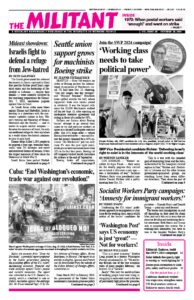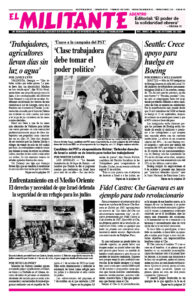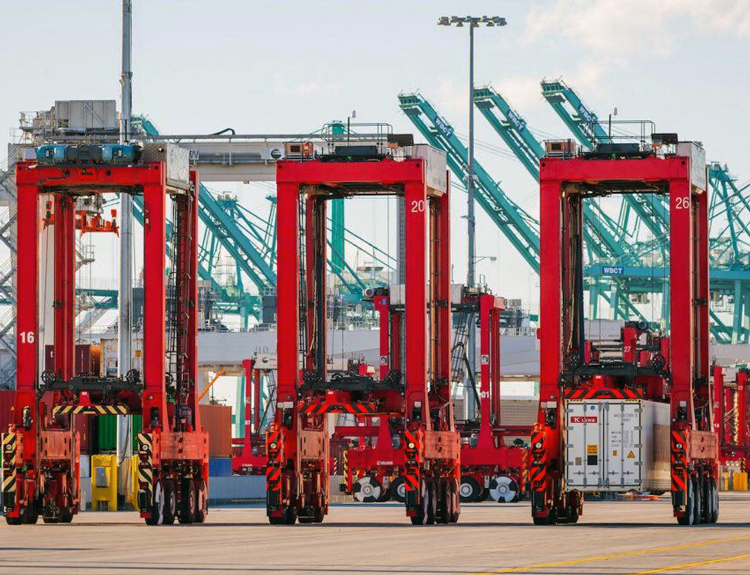After three days on the picket line, the International Longshoremen’s Association suspended its strike at East and Gulf coast ports, extending the current contract to Jan. 15 after winning a 62% wage increase over six years. But the sharpest point at issue in the dockworkers’ fight remains unresolved — the push by bosses to increase their use of job-killing technology in order to speed up work, increasing the danger to workers’ lives and limbs.
“We are asking for more money, but money makes no difference if there are no jobs,” Tim Harris, ILA vice president of the South Gulf Coast District, told the Militant during the strike.
“Safety is a big concern,” Mark Bass, president of ILA Local 1410 at the Port of Mobile in Alabama, said. “The USMX [United States Maritime Alliance] is installing more and more automation, without regard for safety factors, without care for the human beings who work there.”
The bosses slander workers and our unions, claiming we’re opposed to technology. But the fact is workers know exactly how bosses use it, and that’s the problem. In their hands, technology is brought in for only one reason — to increase profits by boosting productivity, cutting the workforce and speeding up production.
In industries across the country “labor-saving” technology has resulted in a brutal labor-intensifying reorganization of work in meatpacking plants, Amazon warehouses and elsewhere. The bosses take no account of the devastating toll on workers’ health and safety unless they’re forced to in response to action by workers and our unions.
The employers’ ceaseless “productivity drives” — speed-up, job combinations and other “cost cutting” measures — increasingly lead to injuries and deaths in factories, mines, and farm fields, and on the rail lines.
Automation was a central question during ILA strikes in 1964 and 1977. As the use of containers became widespread, the need for large crews to load sacks of coffee, nets full of cotton and other cargo was eliminated and turnaround times for ships in port was cut from weeks to days, qualitatively boosting profit margins.
By 1987 membership in the ILA was reduced from its peak of 165,000 down to less than 60,000, despite the union making some important gains during this period, most importantly winning a single master contract to cover all the ports on the East and Gulf coasts instead of port-by-port negotiations.
Today dockworkers face greater uncertainty. It’s not unusual to work a shift of 15-20 hours when a ship is in port and then have no work — or pay — the next week.
Shorter workweek with no cut in pay
At issue is not “automation” per se, but jobs and safety.
Across industry, workers and our unions should respond to bosses’ demands for technology-driven job cuts by demanding a shorter workweek without any cut in take-home pay, to protect all our jobs.
This would ease the competition among workers for jobs and help unify the working class. It would strengthen the fight against forced overtime, “suicide shifts” and bosses’ demands to extend the workday.
No one knows better than dockworkers what the safety issues are at ports and what it will take to fix them. That’s true on every job. No worker has to be injured or die on the job. But to make that a reality, workers and our unions need to fight for workers control over safety, work speed and all aspects of production.
It’s only by the working class taking on these questions that they will be addressed in our interests.
Hundreds of thousands of workers — autoworkers, hotel workers, Machinists at Boeing and more — have gone on strike for better wages, schedules and working conditions. Many of these struggles are tied to the same issues facing longshore workers. Nurses at several hospitals have gone on strike to demand more hiring to cut workloads and ensure patients get the care they need.
In the long run, the capitalist system that organizes everything solely with the aim of making bigger profits must be reckoned with. The wealthy ruling-class families view workers as expendable beasts of burden. The employers operate with no regard for our lives or those of future generations as they pollute the land and seas, and threaten humankind’s very existence with more wars to defend their wealth against all rivals.
Only through the fight for independent working-class political action and the conquest of power by workers and farmers, will the solutions to those issues be found.


